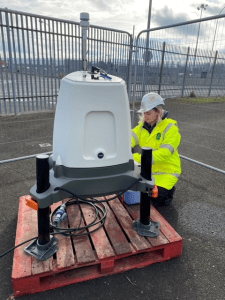Onshore wind energy targets drive investment in modern technology and practices.
For Scotland to achieve net-zero by 2030, it is estimated that the country will need to install at least an additional 12GW of additional onshore wind, though there is ambition to exceed this. In January 2023, Scottish Ministers approved the National Planning Framework 4 (NPF4). NPF4 delivers new guidance to streamline renewable energy projects during the consenting phase. NPF4 is therefore a significant step forward in supporting and accelerating renewable energy developments.
Predicting an increase in demand for fast, reliable and bankable wind measurement campaigns Scottish engineering and environment consultancy, Green Cat Renewables has recently doubled its fleet of ZX 300 wind Lidars that remotely measure the wind. Green Cat offers a life cycle package of project development support including wind resource assessment, noise impact assessment and Asset Management.

Merlin Garnett, Principal Noise Consultant at Green Cat commented: “The expected growth in the domestic onshore wind market has presented the opportunity to expand our fleet of Lidars. ZX 300 Lidars can be installed quickly by a small team and can easily be moved to new locations to assess wind resource at wind farms in complex terrain that wasn’t previously possible, or to accompany noise monitoring campaigns where hub height and 10m wind speed measurements are useful. This gives a huge advantage in terms of de-risking investments in wind as Scotland, and the rest of the UK, race to meet net-zero targets by 2030.”
The ZX 300 onshore wind Lidar uniquely measures wind speeds and characteristics from just 10 meters and up to 300 meters above ground level. ZX 300 is the most validated ground-based wind Lidar in the world, its data is accepted by leading wind consultants for energy yield assessments & site prospecting and its accuracy has been demonstrated at the tallest met masts available globally.


